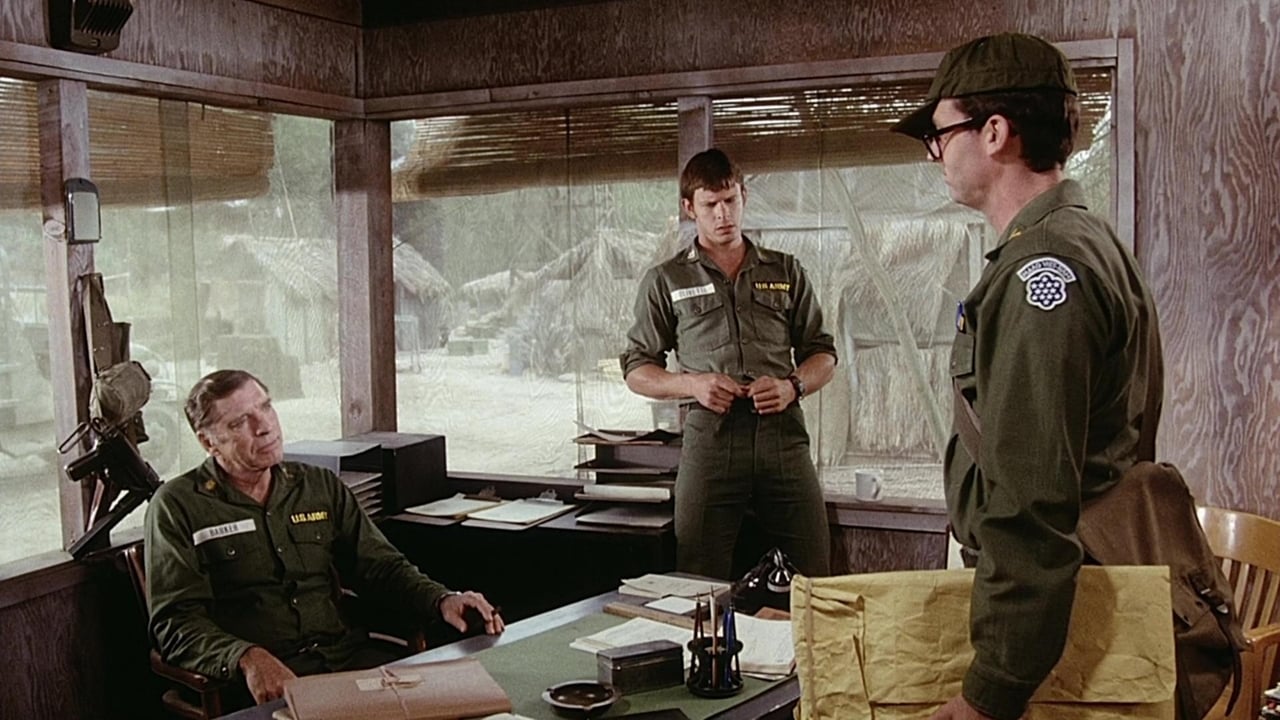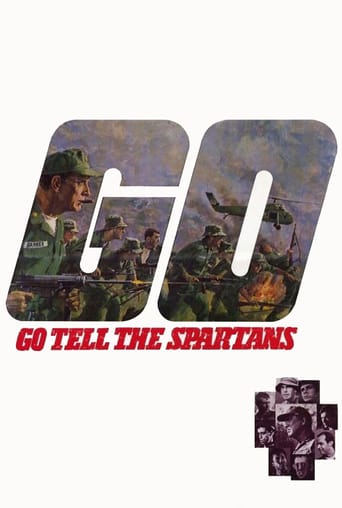

I thought it was a great film, especially as it depicted a lot of "a day in the life" of the soldier's profession. The unit doesn't come into the village shooting from the hip; they put in a lot of time and effort building fortifications, something other films don't often show, even though an infantry soldier is issued both a rifle and an entrenching tool (shovel). The film "Twelve O'Clock High" is a similarly accurate depiction of everything (not just a few air-to-airs of miscellaneous B-17s, to say nothing of whatever stock footage is swept off the cutting room floor) that happens on a heavy bomber base of the 8th Air Force in 1942-3. The documentary quality of the film is completely due to the screenwriter, Beirne Lay Jr, who served on Ira Eaker's staff in 1942 and flew ops with the 100th ("Bloody Hundredth") bomb group. FYI: Bob Dylan's "Brownsville Girl" memorializes (but doesn't name) the film "The Gunfighter," which also pairs the director and star of both films: Henry King and Gregory Peck.Most compelling argument for how true this movie is: in 1984, I worked with a guy who had been a Green Beret captain in Vietnam in 1965-66, and he said "Spartans" should be treated as part fiction and part documentary, because the film was so accurate that it gave him Nam flashbacks.
... View MoreThis is a very good movie about the conditions advisers were confronted with early in Vietnam. Burt Lancaster payed a very good part, even at his age. This movie is heads and shoulders above the "Green Berets". Moc Hoa was an actual USSFG A camp in the delta, a Viet Cong stronghold. Little is shown of the actual camp, but the only issue in the movie is the jungle is at the camp entrance, never happen. That is easy to overlook due to the rest of the movie. The portrayal of the local VC supporters is accurate, friends by day, enemies at night. The bottom line is, you get a feeling what it was like very early in Vietnam, advising the Vietnamese army before it became "The American War". It brings back memories of being in A team 414 at Moc Hoa.
... View More"I've been in the Army twenty-six years and I can tell you it's a con. For a grown man to be trapped in wars, it's embarrassing, humiliating and absurd." - A. Jones"I want no prisoners. I wish you to kill and burn. The more you kill and burn, the better you will please me." - US Brigadier General Jacob SmithIf Sam Fuller directed a war drama set in Vietnam, it would probably look something like Ted Post's "Go Tell the Spartans." Indeed, "Spartans" has all the hallmarks of Fuller's WW2 era war films ("Fixed Bayonettes", "Steel Helmet", "Big Red One"). It's shot on a low budget, is aesthetically plain but functional, it's primarily dialogue driven, its conversations sparkle with the blunt minimalism of 1940s/50s pulp, it's socially conscious without being pretentious, and it touches upon a number of big issues in a number of simple but not simplistic ways.The plot? It's 1964, and American forces have yet to fully commit to an invasion of Vietnam; they still see themselves as "military advisers". One such "adviser" is Asa Barker (Burt Lancaster), a US Major tasked with commanding a poorly-manned outpost in South Vietnam. Barker is battle-weary, tired, and hates having been repeatedly skipped over for promotion.The film's second act watches as Barker assembles a team and sends them off to scout a small hamlet. Once there, this team proceeds to build a defensible base camp. Behind the camp is a graveyard containing 302 french soldiers. Above the graveyard is a placard which reads, in french, "Stranger, tell the Spartans that we remain here in obedience to their orders", a reference to the Battle of Thermopylae, in which a Spartan army held back a larger force. The implication, of course, is that Vietnam held back the French and Japanese colonialists and will likewise hold back the incoming American neo-Imperialists.Rare for a film about Vietnam, "Go Tell the Spartans" deals with the difficulties US soldiers had working together with ARVN, or South Vietnamese, militiamen. These portrayals initially verge on the propagandistic – the ARVN are sadistic and are "correct" in massacring women and children, all of whom are "proven" to be "communist" spies – until the film begins to offer a variety of other conflicting perspectives. Some have complained that the film engages in scapegoating, putting most of its more extreme crimes onto the ARVN, and this is true to an extent. We see, for example, ARVN officers torturing civilians into "falsely" admitting they are "communists", but the film makes it clear that this is all US policy anyway. "Spartan's" characters are all cleanly drawn. One soldier is a skilled and experienced grunt, but the weight of war eventually gets the better of him. He commits suicide, firing a bullet into his own brain. Those who don't suffer combat stress find themselves killed by overeagerness and complacency, whilst naive idealists are brought down to earth. Elsewhere we see selfish careerists, cowards, nutty patriots, downright psychopaths and even several racists who deem American wounded soldiers to be "more human" than their "disposable" South Vietnamese allies. Because the film is stripped down, minimalist, these feel more like theatrical abstractions than poorly written clichés. The Vietnamese, meanwhile, are an eclectic cocktail. The film humanises the Vietnamese, North and South, yet doesn't shy away from portraying violent or duplicitous Vietnamese characters on either side. And all the while, the film, unlike more vague pictures like "Platoon" or "Hamburger Hill", never ignores the elephant in the room: the fact that Vietnam was essentially a nation seeking freedom from foreign occupation; the United States sided with the French colonialists, turned down offers to assist Vietnamese independence movements for decades, artificially divided the nation as a pretext for war, scuttled local elections, engaged in regime change, put in place dictators in the South and set about killing 3 to 5 million, blanket bombing the country and bathing it in all manners of chemicals, weapons and other abominations.Whilst "Go Tell The Spartans" is mostly unremarkable acted, Burt Lancaster is excellent in his role. He's a cranky old man, always juggling logistical problems, incompetent leaders/soldiers or trying his best to play games of military realpolitik. The absurdity of flawed intelligence reports and hokey psy-ops programmes irk the Major, but he's seen it all before. Vietnam era war flicks tend to end with a once idealistic soldier surviving and so becoming hardened and cynical (in "Full Metal Jacket" we witness the reverse, the cynic conning himself into naive participation). In "Go Tell the Spartans" everyone dies but a character called Courcey (Craig Wasson), an idealist whose enthusiasm for the Vietnam War turns sour. "I'm going home, Charlie, if they'll let me," he says during the film's climax. The war's a bad idea, director Ted Post affirms, the Spartan-like Vietnamese destined to make the white man pay (though in terms of their actual objectives, the Americans wholly "won" the Vietnam War). An on-screen caption then emphasises the date "1964", an ironic counterpoint to the massive mobilisation of western hardware which the film knows is on the horizon.8/10 - Underrated. See Pontecorvo's "The Battle of Algiers" and "Burn".
... View MoreFor some reason, I hadn't seen this film before. I was in the army from 67-70 (did not go to Vietnam) and have read, written, and watched films about that time ever since. Burt Lancaster was...Burt Lancaster. He had some great lines, but I agree with the reviewer who commented on his age being a bit of a distraction. But the story more than compensated. This was when Americans in general had never heard of Vietnam. Burt's amazement that a draftee would be there spoke volumes about how early in our engagement this was. Yet, there were engagements. The US military was actively supporting the south Vietnamese, including fighting battles on the ground and giving air support. The ensemble cast felt like a stereotypical war movie cast, but the lighter dialogue in the first half of the film starts to give way to the seriousness of the situation. And finally, by the end of the film's "second act" it takes on more of an "alamo" feeling.Burt's character's cynicism, plus the viewers' historical knowledge of how things turned out for the US military in Vietnam, makes for some powerful moments. It also leads me to consider this an anti-war film. Because in the end, what did all the soldiers who died in the movie die for? As Burt's Major tells the hung-ho captain, this isn't like world war II. This one is just running us in circles. He knew the score in 1964, but unfortunately it was generals like Dolph Sweet's character who drove the policies that LBJ followed that resulted in so many more needless deaths.
... View More